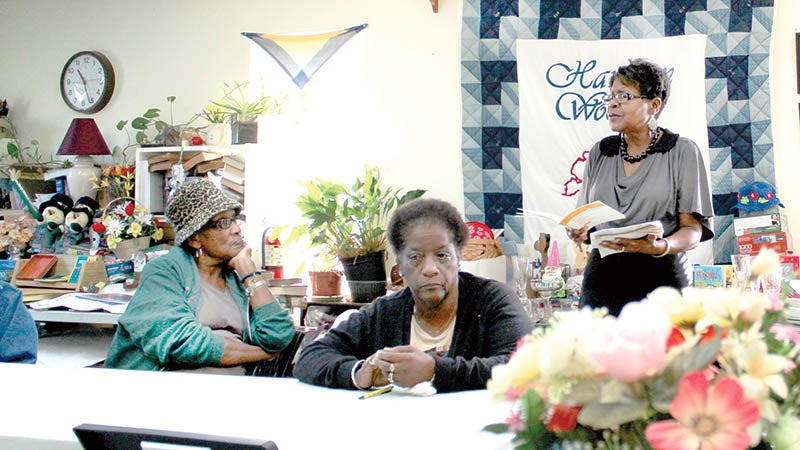Seniors learn abuse awareness tips
Published 11:52 am Thursday, November 2, 2017

- Blannie Hunt (standing) of Roanoke Chowan S.A.F.E. provides abuse prevention tips to a group of older adults at the J.W. Faison Senior Center in Jackson. | Staff Photo by Holly Taylor
JACKSON – All throughout October, Blannie Hunt from Roanoke Chowan S.A.F.E. (Services for Abused Families in Emergences) has conducted various seminars and presentations on the topic of domestic violence and abuse. She wrapped up Domestic Violence Awareness Month by visiting a group of senior citizens to discuss warning signs and prevention tips.
“Elderly abuse is out here. People don’t talk about it like they should,” said Hunt as she addressed the group who gathered Tuesday morning at the J.W. Faison Senior Center in Jackson. “There’s a lot of help for elderly abuse, but a lot of us just don’t know.”
Hunt cautioned the group to be alert for signs of abuse because it can happen to anyone, no matter their age. The mistreatment can come from anywhere, ranging from children and spouses to caregivers and nurses.
Though quick to point out that a majority of care providers were kind and treated their patients well, Hunt asked people to be on alert for the few who perpetrate abuse and do not take care of the people in their charge.
Both Hunt and the attendees shared different stories of abuse they had heard of or witnessed firsthand—such as neglectful care of bodily functions or stealing money from the patient—in order to identify warning signs and look for ways to prevent the abuse from reoccurring.
Listing several important questions to remember, Hunt said to the group, “If you’ve got a loved one in a nursing home, ask them: Does anyone hurt you? Has anyone touched you wrong? Has anyone ever made you do things you didn’t want to do? Has anyone made you sign documents [to turn over money]?”
She also mentioned a few tips for adult children to be aware of when checking on their elderly parents. These tips include paying attention and listening when they speak up about problems, checking their finances to make sure caregivers are not stealing, noticing if they’re afraid to speak around a caregiver, and frequently asking questions about their care.
In regards to finances in particular, Hunt said it was especially important to keep items like checkbooks in a secure, locked place.
Hunt’s presentation also focused on warning senior citizens about abuse from their own family members.
“You put a stop to it the first time,” Hunt said on the importance of identifying abuse quickly.
Again, the group shared personal stories of abuse they had seen in order to show the magnitude of the problem and realize how often people are affected. They discussed factors such as drug addiction and mental illness which contribute to the issue.
Ultimately, Hunt stressed the need to seek out help for those in abusive situations.
“If we see a son or daughter being mean to a mother, mistreating them,” Hunt explained, “let them know they don’t have to put up with that.”
“You do not have to stay in this bad situation,” she continued. “There’s help out there. It’s free.”
Among other resources, such as the shelter that Roanoke Chowan S.A.F.E. provides, Hunt also gave the group the number for the NC Department of Health and Human Services hotline which can help people report abuse. The toll-free number is 1-800-662-7030.
“Our older days need to be our golden days,” Hunt said to emphasize the idea that no one should have to deal with any sort of domestic violence or abuse, especially the elderly among us.

